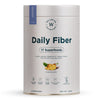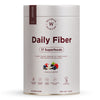In the realm of nutrition, few elements are as universally acclaimed as fiber, a dietary superhero known for its vital role in digestive health. Yet, as we explore fiber intake, a pertinent question surfaces: Does the consumption of this nutritional powerhouse differ between men and women? Join us on this journey as we unravel the intricate dynamics of fiber intake and its unique considerations for both genders.
What is Fiber?
Fiber, a carbohydrate found in plant-based foods such as fruits, vegetables, whole grains, and legumes, distinguishes itself by its resistance to complete digestion. The human body cannot digest fiber, yet fiber plays a significant role in our digestive system.
How Does Fiber Work?
Beyond its classification, understanding how fiber operates within the body reveals its true significance. The two types of fibers, soluble and insoluble, contribute distinctively to our well-being. Soluble fiber, dissolving in water, forms a gel-like substance that actively lowers cholesterol and regulates blood sugar levels. In contrast, insoluble fiber adds bulk to stool, promoting regular bowel movements and acting as a bulwark against constipation. Additionally, fiber serves as food for the probiotic bacteria in the gut, thus maintaining gut flora balance.
What Happens If You Have Less Fiber in Your Diet?
Without an adequate daily fiber intake, our digestive system can falter, giving rise to a cascade of potential issues. Constipation and discomfort become likely companions, underscoring the importance of fiber in maintaining a healthy digestive rhythm. Moreover, a fiber deficiency has been associated with an increased susceptibility to chronic conditions such as heart disease and certain types of cancer, highlighting its role as a preventive force in overall health.
Health Benefits of Fiber
Using fiber for digestion and weight loss are common benefits of fiber, but fiber offers a range of health benefits, contributing to overall well-being. Here are some critical advantages of including an adequate amount of fiber in your diet:
- Preventing Constipation: Insoluble dietary fiber adds bulk to stool, promoting regular bowel movements and preventing constipation.
- Supporting Gut Health: Certain types of fiber act as food for beneficial gut bacteria, promoting a healthy balance in the digestive system.
- Lowering Cholesterol Levels: Soluble fiber, found in oats, beans, and fruits, can help lower cholesterol levels, reducing the risk of heart disease.
- Regulating Blood Sugar: Fiber, particularly soluble fiber, slows the absorption of sugar, helping to regulate blood sugar levels and reduce the risk of diabetes.
- Appetite control: High-fiber foods provide a feeling of fullness, which can aid in weight management by reducing overall calorie intake.
- Lowering Blood Pressure: Some studies suggest that a fiber-rich diet may contribute to lower blood pressure, promoting heart health.
- Relieving Symptoms of IBS: For individuals with IBS, fiber, especially soluble fiber, can help manage symptoms such as abdominal pain and irregular bowel movements.
- Easy Bowel Movements: Adequate fiber intake can help prevent hemorrhoids by promoting softer and more easily passed stools, reducing strain during bowel movements.
- Improving Lipid Profile: Fiber may contribute to a more favorable lipid profile by reducing LDL cholesterol (the "bad" cholesterol) levels.
Are Dietary Requirements of Fiber Different in Men and Women?
So, how much fiber per day? The daily fiber recommendation for men is 30 g, while for women, it is 25g. To give you an idea, a medium-sized apple contains only 3 grams of fiber.
This is a collective guideline for how much fiber to consume daily, but we need a more nuanced approach. Considerations such as age, activity level, and overall health influence the ideal fiber intake for men and women. Women, especially during certain life stages like pregnancy or menopause, may require adjustments in their fiber consumption to address unique physiological needs. Likewise, men, depending on their age and health status, may find tailored dietary plans better suited to optimize fiber's benefits.
How Can You Ensure Enough Fiber Intake Every Day?
Satisfying daily fiber requirements need not be daunting; rather, it can be an enjoyable journey toward optimal health. To ensure you're meeting your daily fiber needs, consider incorporating the following practical tips into your dietary habits:
-
Include a Variety of Foods
As mentioned above, an apple contains about 3 grams of fiber, so to complete your daily fiber requirement, you will need about 10 of these. Well, that’s not very feasible and practical, so you could also get your fiber from veggies and grains. Diversify your daily meals with a spectrum of fruits, vegetables, whole grains, and legumes. Each food group has its own unique fiber content and nutritional benefits. -
Try Fiber supplements
Besides food, you can also include fiber supplements in your diet to easily cover your daily requirements. -
Read Food Labels
Empower yourself with knowledge by reading food labels. Paying attention to the fiber content listed on packaged foods aids in making informed choices while navigating the aisles of the grocery store. -
Gradual Increases
If your diet falls short of the recommended fiber intake, consider making incremental adjustments. Abrupt changes can disrupt your digestive system, so ease into higher fiber consumption to allow your body to adapt. -
Stay Hydrated
Fiber absorbs water, and staying adequately hydrated supports its digestive benefits. Ensure you drink enough fluids throughout the day to complement your fiber-rich diet.
Wrapping Up
While the foundational principles of fiber intake remain steadfast for both men and women, recognizing the nuances of individual dietary requirements is key. As you tailor your nutritional approach to your unique needs, remember that fiber is not just a dietary component but a versatile ally in the quest for optimal health. Whether you're a man navigating the challenges of a specific life stage or a woman addressing the dynamic shifts within your body, fiber is an indispensable part of your diet that cannot be ignored.





























 DOWNLOAD NOW
DOWNLOAD NOW
